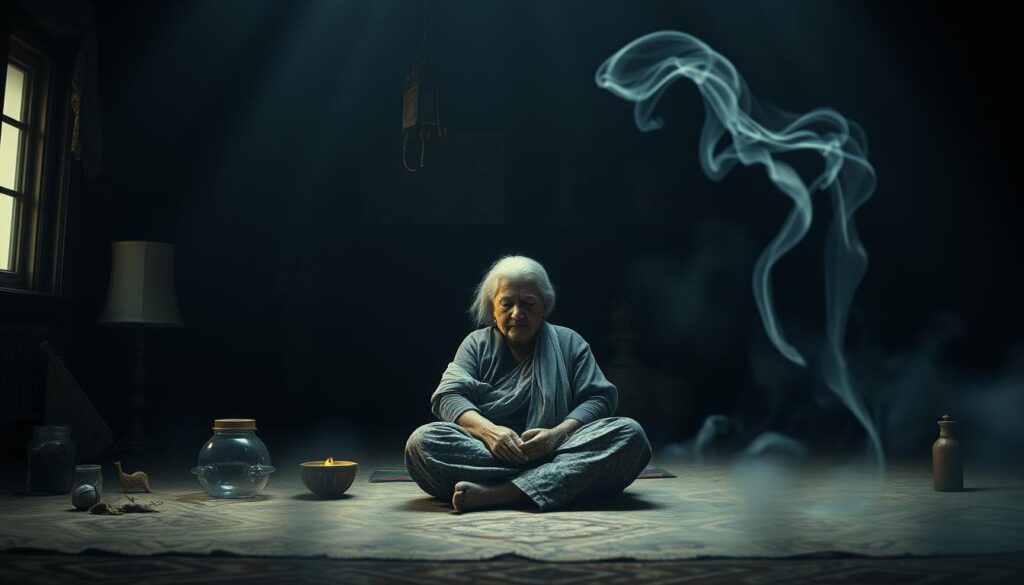That vivid nighttime visit from someone you’ve lost? It’s likely your mind reconciling love with loss—not a cosmic voicemail. But here’s the twist: Freud called dreams “the royal road to the unconscious,” while Jung saw them as bridges to universal truths. So which is it: brain static… or something deeper?
I once woke sobbing after dreaming my late mom handed me tamales, her laugh echoing like she’d never left. The scent of cumin lingered for hours. Was that her presence, or just my hippocampus replaying Sunday dinners? Let’s unpack this.
Modern psychology suggests these visions blend unresolved emotions with neural housekeeping. Think of your brain as a over-caffeinated librarian: it’s sorting memories, filing regrets, and occasionally misfiling the “she’s still here” card. Cultures worldwide lean into this ambiguity—Mexico’s Día de los Muertos literally sets a place for departed loved ones.
This isn’t woo-woo speculation. We’ll dissect symbols (that recurring kitchen table?), decode emotional whiplash, and explore whether you’re seeking closure… or receiving it. Spoiler: Your tears have more layers than an onion.
Interpreting the Emotional Layers in Your Dream

Your subconscious isn’t just replaying memories—it’s doing emotional math. Those midnight visions of a deceased mother alive? They’re like receipts from your mind’s 24/7 grief café, tallying what you’ve ignored while awake. I’ve had clients describe dreams where their mom critiques their life choices… silently. No words, just raised eyebrows across the kitchen table. Gut punch? Absolutely. Meaningful? Let’s dig.
Unraveling Unresolved Grief and Guilt
Dreams act as your brain’s emotional ledger. That argument you never had? The hug you forgot to give? They surface as cryptic scenes—a half-packed suitcase, a phone with no dial tone. One woman dreamed her mom kept rearranging her bookshelf. Turns out, she’d avoided sorting her mother’s estate for two years. The guilt was literally shelved.
Processing the Feelings of Loss in Real Time
Daily stress amplifies these visions. Rough day at work? Suddenly your dream-mother’s lecturing about your career path. Your brain’s mashing up current anxieties with old wounds. I call it “grief multitasking.” Notice patterns: Does her expression soften when you’re kinder to yourself? That’s your psyche nudging you toward self-compassion.
| Emotion | Dream Manifestation | Real-Life Impact |
|---|---|---|
| Grief | Silent conversations | Unsaid words haunting daily life |
| Guilt | Repetitive tasks | Avoidance of closure activities |
| Daily Stress | Criticism from dream figure | Projection of self-doubt |
Here’s the kicker: If your deceased mother starts appearing in new locations—say, your childhood home instead of the hospital—that’s progress. Your mind’s rewriting the script. Still hurts? Yeah. But maybe it’s your turn to stop seeing her death as an overdue library book.
Common Dream Scenarios Featuring a Mother’s Presence

Ever had a midnight chat with someone who’s not on this Wi-Fi plan anymore? These encounters often play out like silent films where your mind’s the director—and it’s really into symbolism. Take Jamie, who dreamed her deceased mother sorted baby clothes without speaking. Turned out, she’d been avoiding her own fertility struggles. The message? “Stop folding anxiety into tiny onesies.”
Conversations and Silent Exchanges in the Night
Your brain loves wordless drama. One client’s mom kept pointing at a broken clock during his promotion week. No dialogue—just relentless ticking. Later, he realized: “I’d been counting down to failure.” These mother dreams often highlight what daylight logic ignores. That smirk she gives when you’re oversharing at parties? Your subconscious screaming “Boundaries, sweetheart!”
Visitation Dreams and Their Intimate Nuances
Some visits feel like HD reruns of childhood breakfasts—maple syrup scent included. Others? Surreal mashups. Like dreaming your mom slow-dances with your new boss while humming Cardi B. Visitation dreams thrive on contradictions: familiar warmth wrapped in absurdity. A woman once told me her mother appeared as a lighthouse keeper during her divorce. “She literally showed me where the rocks were.”
- The grocery store hug that dissolves your work stress
- Her laughing at inside jokes only you two knew
- Sudden appearances during major life crossroads
Notice patterns. Does her sweater color match your current mood? Are you both eating her famous meatloaf…in Tokyo? These details aren’t random—they’re cheat codes to your emotional updates. Next section, we’ll crack them like a safe full of therapy bills.
Step-by-Step Techniques to Decode Your Dream

Ever jolted awake clutching phantom tamales or half-remembered laughter? Those fragments matter. Decoding dreams of a deceased mother isn’t about psychic hotlines—it’s detective work for your psyche. Let’s grab our magnifying glasses.
Creating a Detailed Dream Journal
Keep a notebook by your bed—not your phone. Blue light kills dream recall. Write these three things immediately upon waking:
- Dominant emotion (panic? warmth?)
- One concrete image (steaming coffee cup, frayed sweater)
- Physical sensations (cold feet, tight chest)
I once tracked a client’s recurring kitchen table dreams. Turns out, her mom’s last birthday party happened there. The journal revealed she’d been avoiding anniversary dates.
Mapping Life Events to Dream Symbols
Draw two columns: “Dream Clues” and “Real-Life Parallels.” That flickering lamp in your dream? Maybe it mirrors your unstable job situation. Here’s a cheat sheet:
| Symbol | Life Event | Emotional Link |
|---|---|---|
| Overgrown garden | Neglected friendships | Guilt about isolation |
| Broken necklace | Recent breakup | Fear of lost connections |
| Empty chair | Upcoming graduation | Unacknowledged loneliness |
Notice patterns over weeks. A woman realized her mother’s dream outfits changed with her grief stages—hospital gowns faded as sundresses appeared. Your mind’s speaking in metaphors. Time to learn the language.
Understanding Dreams About Your Dead Mother Being Alive

Ever wondered why your mind conjures up these vivid reunions? It’s like your brain’s throwing a surprise party where personal history crashes into cultural folklore. Let’s crack why that kitchen table feels so real—and why your soul might be RSVPing.
Psychological Insights Rooted in Personal History
Your childhood home’s layout? The way she tied her apron? These aren’t random details. Neuroscience shows our oldest memories resurface during REM sleep, blending with current struggles. One client dreamed her mom kept fixing a wobbly lamp—a metaphor for her shaky career pivot. Her mind was shouting: “Remember how she handled chaos?”
Freudians argue these visions let your inner child chat with unmet needs. That time she taught you to ride a bike? Now it’s a symbol for navigating grief’s potholes. If she’s laughing in the dream, your psyche might be nudging you toward joy despite loss.
Cultural and Spiritual Interpretations at Play
While psychologists see metaphors, many cultures take these dreams literally. Mexico’s Día de los Muertos views them as annual check-ins from loved ones. Celtic traditions see crows as messengers—your mom might’ve borrowed feathers to say, “Hey, you’ve got this.”
Contrast this with biblical visions, where resurrected figures often signal transformation. Whether you see it as divine fax or mental mixtape, the comfort’s real. A friend once dreamed her mom handed her a compass during a divorce. “She literally pointed me north,” she laughed.
| Culture | Symbol | Interpretation |
|---|---|---|
| Mexican | Marigold petals | Guided path from beyond |
| Japanese | Folding paper cranes | Unfinished business |
| Celtic | Ravens | Protection during transitions |
Notice how your deceased mother’s demeanor shifts? Cultural lenses tint those details. A somber expression might mirror your guilt, while her laughter could echo ancestral resilience. Either way, these visions aren’t just reruns—they’re invitations to rewrite your story.
Navigating Personal Resolution and Growth Through Dream Analysis

What if your midnight mind-movies hold keys to daytime healing? Those surreal scenes of a deceased mother brewing coffee or folding laundry aren’t just grief echoes—they’re invitations to rewrite your story. I’ve watched clients transform raw dream fragments into life-changing epiphanies. Take Mark, who kept dreaming his mom handed him broken umbrellas during his bankruptcy. Turns out, she’d always said, “Protection’s an inside job.”
Merging Self-Care with Emotional Processing
Try this 3-step ritual next time you wake from a vivid mother dream:
- Chug water while mentally replaying one concrete detail (steaming teacup, mismatched socks)
- Sketch the scene with your non-dominant hand—awkward lines reveal hidden emotions
- Ask aloud: “What’s the opposite of this dream’s message?”
A client once dreamed her deceased mother kept rearranging her shoes. Through this practice, she realized: “Mom’s telling me to walk my own path.” Three months later, she left her toxic job. Sometimes, your psyche dresses breakthroughs in familiar faces.
| Dream Symbol | Self-Care Action | Growth Outcome |
|---|---|---|
| Overflowing sink | Schedule therapy session | Reduced anxiety about control |
| Locked photo album | Write unsent letter | Released childhood resentment |
| Foggy mirror | Start morning affirmations | Increased self-trust |
Notice recurring messages about unfinished conversations? Your mind’s nudging you toward closure. I’ve had dreams where my mom criticized my life choices—turns out, it was my own imposter syndrome wearing her face. Creepy? Yes. Helpful? Absolutely.
When dream meanings click, they’re like finding your mom’s old recipe card—suddenly, you’re nourished. Jot down post-dream feelings in red ink (studies show color boosts memory). If symbols keep haunting you, grab a dream interpreter—think of them as translators for your soul’s morse code.
Parting Thoughts on Unraveling Your Subconscious Messages

Waking up with echoes of laughter that faded years ago? Those midnight encounters aren’t just random brain TV—they’re layered life transcripts written in symbols only you can decode. I’ve seen clients shift from hospital-bed visions to beachside chats over months, their minds rewriting grief’s geography one dream at a time.
Your mother’s cameos—whether she’s baking bread or rolling her eyes at your life choices—aren’t prophecies. They’re emotional origami: folded memories, creased regrets, and sometimes, hidden permission slips. That dream where she nods at your new career path? Might be your courage wearing her smile.
Cultural wisdom and brain science agree here. Whether you see these moments as ancestral whispers or neural spring cleaning, they demand curiosity over certainty. A client once realized her recurring train-station dreams mirrored her stalled divorce—only when she bought the ticket (literally) did the visions stop.
Keep a journal. Talk to therapists. Burn sage if it helps. But remember: Some messages arrive half-coded, like postcards from a country you’ve never visited. The kitchen table chats that leave you raw? They’re not about rewiring the past—they’re blueprints for building what comes next.
So tonight, when she appears holding that inexplicable umbrella or humming your childhood lullaby, ask: “What’s this really about?” Then listen. Not just to her, but to the quietest parts of you. After all, the best interpretations often sound like your own voice, just louder.






